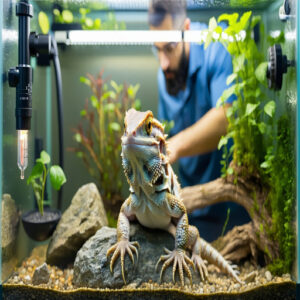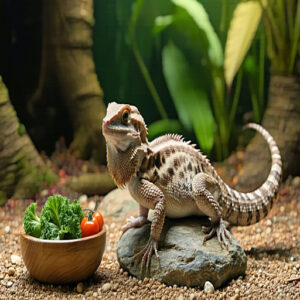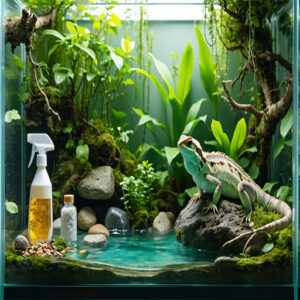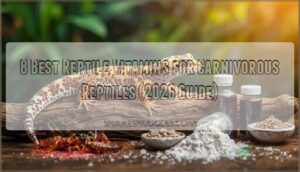This site is supported by our readers. We may earn a commission, at no cost to you, if you purchase through links.
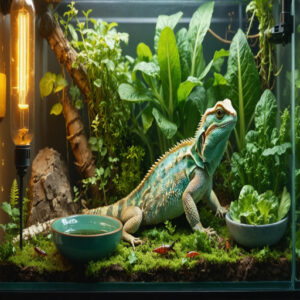
Provide species-appropriate diets rich in protein (like insects or egg supplements), fiber (leafy greens, squash), and essential nutrients like calcium and vitamin D3 to prevent issues like metabolic bone disease.
Create a habitat that mimics their natural environment with temperature gradients, UVB lighting, and proper humidity.
Watch for signs of illness—weight loss, lethargy, or dull skin—and track feeding habits to adjust care as needed.
Handle your reptile gently and maintain clean enclosures to prevent infections.
A little care goes a long way toward a happy, thriving pet!
Table Of Contents
- Key Takeaways
- Reptile Nutrition Basics
- Creating Optimal Habitat
- Reptile Health Monitoring
- Common Reptile Health Issues
- Reptile Care and Handling
- Frequently Asked Questions (FAQs)
- Can you handle reptiles?
- Why should you choose a reptile clinic?
- Do Reptiles need medical attention?
- Can you keep a reptile at home?
- How do I choose a veterinarian for my reptile?
- How to keep reptiles healthy?
- What are four signs of illness or disease in a reptile?
- What are some concerns when caring for reptiles?
- What are some of the signs of ill reptilian health?
- How do I treat a reptile burn?
- Conclusion
Key Takeaways
- Feed your reptile a species-specific diet rich in protein, fiber, calcium, and vitamin D3 to prevent issues like metabolic bone disease.
- Create a natural environment with temperature gradients, UVB lighting, and proper humidity to mimic their natural environment and support health.
- Monitor your reptile’s weight, behavior, and appearance regularly to catch early signs of illness like lethargy, dull skin, or appetite changes.
- Handle your reptile gently, clean their enclosure frequently, and schedule regular check-ups with a reptile-savvy vet to maintain their overall well-being.
Reptile Nutrition Basics
Feeding your reptile the right diet isn’t just about keeping them full—it’s about ensuring they get the nutrients they need to thrive.
From protein-packed prey to calcium-rich supplements, understanding their dietary needs is key to supporting their health and growth.
Protein Sources for Growth
Protein-rich foods are the backbone of reptile nutrition.
To keep your scaly friend thriving, focus on these essentials:
- Meat sources: Thawed rodents or rabbits for carnivores.
- Insect nutrition: Crickets, mealworms, or superworms for insectivores.
- Egg supplements: Occasionally for added protein.
- Fish oil: Boosts omega-3s.
- Commercial diets: Supplement with fresh options.
Beyond protein, make certain a balanced intake of other essential nutrients, including key vitamins and minerals to prevent metabolic bone disease.
Tailor your reptile feeding wisely!
Dietary Fiber for Digestion
Ever wonder how fiber keeps your reptile’s gut running smoothly?
Fiber intake supports gut health by aiding digestive enzymes and promoting nutrient absorption.
Great fiber sources include leafy greens, squash, and certain fruits, depending on your reptile’s diet.
Balance is key—too much fiber can disrupt digestion, and maintaining digestive health is crucial, so follow reptile nutrition advice to achieve this.
Consider dietary supplements if needed, to ensure your reptile is receiving all the necessary nutrients for optimal health.
Mineral Balance and Vitamin D3
Strong digestion needs more than fiber—mineral balance and vitamin D3 keep your reptile thriving.
Without proper calcium and phosphorus ratios, reptiles risk osteoporosis or worse.
Vitamin D3 plays a pivotal role in calcium absorption and bone health, impacting overall well-being according to this helpful reptile vitamin D3 guide.
For ideal calcium intake, consider browsing a quality reptile calcium supplement website.
Here’s your checklist for bone health:
- Use calcium-rich supplements without phosphorus.
- Rely on UVB lighting for natural Vitamin D3 benefits.
- Avoid overdosing supplements.
- Monitor reptile nutrition closely.
- Choose quality mineral supplements.
Calcium for Strong Bones
Calcium is a cornerstone for reptile health, ensuring proper bone growth factors and preventing issues like reptile osteoporosis or metabolic bone disease.
Pair calcium supplements with UVB lighting to activate vitamin D benefits, aiding absorption.
Strong bone tips? Dust prey or veggies with calcium powder. Without this, reptiles risk brittle bones—so prioritize their nutrition and keep their skeletons sturdy.
Creating Optimal Habitat
Creating the perfect habitat for your reptile means replicating its natural environment with precision.
You’ll need to balance temperature, humidity, lighting, and space to keep your pet healthy and stress-free.
Temperature Gradients for Digestion
Keeping your reptile’s metabolism humming starts with proper thermal regulation.
A temperature gradient lets them pick their perfect spot—warm for digestion, cool for relaxation.
Use heat lamps or ceramic emitters for precise temperature control, but skip heat rocks to avoid burns.
Consistent heat management boosts digestive health, prevents sluggishness, and keeps your pet thriving.
Reptile temperature control matters!
Creating an ideal temperature gradient is essential for maintaining superior health and digestion in reptiles.
UVB Lighting for Calcium Absorption
UVB lighting is a game-changer for reptile bone health, helping them absorb calcium and prevent deficiencies.
Without it, even the best calcium supplements won’t work.
Here’s some reptile health advice:
- Use full-spectrum UVB bulbs.
- Replace bulbs every 6-12 months.
- Mimic natural lighting schedules.
- Combine UVB light therapy with reptile vitamin supplements.
- Verify proper basking distances for Vitamin D benefits.
Proper use of reptile UVB lighting is necessary for maintaining healthy reptiles.
Humidity Levels for Preventing Dehydration
Proper UVB lighting helps calcium absorption, but hydration needs are just as essential.
Humidity control is key for dehydration prevention, use a hygrometer to monitor reptile humidity levels—tropical species thrive at 60%+, while desert-dwellers prefer lower.
Boost moisture management with misting, water bowls, or live plants, these reptile hydration tips guarantee water balance, keeping your pet healthy and stress-free.
Space Considerations for Movement
A well-planned reptile habitat setup means giving your pet room to roam.
Verify the enclosure size matches their growth, with ample movement space for exercise.
Add climbing structures for activity and hiding places for security, and designate exercise areas to mimic natural behaviors.
A spacious reptile enclosure promotes health and also encourages environmental enrichment, keeping your reptile happy and stress-free.
Reptile Health Monitoring
You’ve got to keep a close eye on your reptile’s health by monitoring their weight, behavior, and appearance regularly.
Spotting early signs of malnutrition or illness, like changes in appetite or skin condition, helps you make timely adjustments to their diet and care routine, which is crucial for maintaining your reptile’s overall appearance.
Recognizing Malnutrition Symptoms
Spotting malnutrition signs in reptiles can be tricky, but keep an eye out for weight loss, reduced appetite, or feeding issues.
Nutrient deficiencies might show up as lethargy, weak bones, or dull skin.
Regular reptile health checks help catch these problems early, if your pet’s behavior shifts or their appearance changes, it’s time to reassess their reptile nutrition plan, considering signs like weight loss.
Preventing Health Issues Through Nutrition
Spotting malnutrition signs is step one, but preventing issues means mastering reptile nutrition.
Stick to these tips for a healthy feeding routine:
- Focus on nutrient balance with species-specific reptile diets.
- Incorporate dietary supplements like calcium and vitamin D3.
- Rotate food items for variety.
- Plan nutrition around natural eating habits.
- Avoid overfeeding to prevent obesity-related health problems.
This set of guidelines is designed to help create a well-rounded feeding regimen for reptiles, ensuring they receive the necessary nutrients for optimal health.
Documenting Feeding Habits and Health Changes
Tracking what your reptile eats and how they behave isn’t overkill—it’s smart care.
For a thorough guide to reptile nutrition, explore this helpful resource on reptile feeding advice.
Use a Reptile Journal or app for Feeding Records and Health Tracking.
Noticed skipped meals or sluggishness? It’s like your reptile’s way of texting you “something’s up.”
| Log Type | What to Record | Why It Matters | Tools to Use |
|---|---|---|---|
| Feeding Records | Food type, amount | Monitors nutrition consistency | Notebook, apps |
| Health Tracking | Weight, shedding, feces | Detects early health changes | Scale, journals |
| Care Diaries | Behavior patterns | Identifies stress or illness | Daily notes |
| Nutrition Logs | Supplements given | Supports balanced diet | Spreadsheet, charts |
Adjusting Diets for Specific Health Conditions
When tackling reptile health issues, therapeutic feeding is key.
Adjust nutrition planning by offering special diets customized to conditions like metabolic bone disease or reptile digestive health.
Use health supplements, including calcium and vitamin D3, to maintain nutrition balance.
Always consult a vet for dietary therapy advice.
Small tweaks, like adjusting food types or portions, can make a big difference in reptile health.
Common Reptile Health Issues
Reptiles can face a variety of health problems, from respiratory infections to digestive issues, if their care isn’t spot on.
By spotting early signs like lethargy, skin changes, or unusual behavior, you’ll help keep your scaly friend thriving, which is crucial for their overall health and depends on recognizing key issues such as respiratory infections.
Heart and Blood Vessel Disorders
Heart and blood vessel disorders in reptiles, like cardiac disease or vessel damage, often stem from poor diets or infections.
Symptoms include lethargy, swelling, or trouble breathing.
Blood clots and heart failure aren’t uncommon, so regular reptile health checks are key.
A balanced diet, proper habitat, and reptile veterinary care can prevent cardio issues, keeping your pet’s heart strong and healthy.
Digestive Disorders and Respiratory Infections
Poor diets and cramped enclosures often lead to digestive disorders like intestinal parasites or gout, causing pain and weight loss.
Respiratory infections, triggered by bad humidity or temperature, bring breathing problems like wheezing and open-mouth breathing.
Focus on infection control with proper husbandry and regular reptile health checks, which allows for early reptile disease treatment, like antibiotics, protecting both digestive health and respiratory care.
Reproductive Issues and Skin Infections
Addressing reptile fertility and skin infections requires vigilance.
Reproductive issues, like egg binding, often stem from poor nutrition or inadequate habitat conditions.
Skin lesions or infections, caused by improper hygiene or injuries, can escalate quickly without treatment.
Focus on infection control and wound healing by maintaining clean enclosures, monitoring for reptile skin problems, and consulting a vet for reproductive care and reptile health issues.
Regular checks for reptile skin problems can help identify potential issues early on, allowing for timely intervention and treatment.
Preventing Health Issues Through Hygiene
Your reptile’s health hinges on maintaining clean enclosures and consistent hygiene practices.
A healthy environment prevents zoonotic diseases and common reptile health issues through smart sanitation methods.
Here’s what you need for effective disease prevention:
- Perform weekly deep cleans using reptile-safe disinfectants
- Remove all items monthly for thorough sanitizing
- Monitor ventilation to prevent stale, damp air
- Replace or rotate substrate regularly
- Clean surfaces immediately after spotting waste
This set of practices is crucial for creating an environment that supports your reptile’s overall well-being by promoting smart sanitation methods.
Reptile Care and Handling
You’ll need to handle your reptilian friend with gentle confidence and maintain a consistent routine to build trust, just like you’d approach making friends with a new classmate.
While each species has unique care requirements, you can guarantee your pet’s well-being by providing proper nutrition, maintaining ideal habitat conditions, and scheduling regular check-ups with a reptile veterinarian.
Handling Reptiles Safely and Humanely
Learning safe reptile handling techniques starts with understanding your scaly friend’s comfort zone.
When picking up your pet, support its entire body using a gentle touch and secure grip – imagine holding a delicate smartphone.
Stay calm and avoid sudden movements, as these can trigger stress responses.
For larger species, practice humane restraint by supporting both the head and body while maintaining a safe, confident hold, which helps in establishing a safe environment.
Providing Mental Stimulation and Social Interaction
Gentle handling builds trust, but reptiles also need mental enrichment to thrive.
Add environmental toys like climbing branches or puzzle feeders to spark curiosity. Reptile interaction, such as hand-feeding or supervised exploration, encourages social bonding.
Watch for stress signals—hiding too much or aggression—and adjust activities.
Thoughtful reptile socialization keeps them active, happy, and engaged in their environment.
Proper reptile handling safety techniques are essential for preventing injuries and ensuring a positive experience for both the reptile and the handler, which requires reptile handling safety.
Creating a Suitable Environment for Reptiles
Designing a reptile habitat isn’t just about looks—it’s about creating comfort and health.
Focus on habitat design that mimics nature:
- Use thermal control with a temperature gradient for basking and cooling.
- Maintain proper humidity levels using misting or substrates.
- Add reptile lighting like UVB for metabolic health.
- Include environmental enrichment like climbing branches or hides to reduce stress.
When setting up a reptile enclosure, consider purchasing complete reptile habitat kits to guarantee all necessary components are included for a healthy environment.
Regular Veterinary Check-ups for Reptiles
Routine veterinary checkups are your secret weapon for preventing reptile health issues.
A reptile veterinarian can spot problems early with medical tests like fecal exams or X-rays.
Prep for vet visits by documenting feeding habits and behavior changes, and consider animal hospital tours to ease nerves.
Regular health checks guarantee your pet’s thriving, so trust expert care to keep your reptile happy, and remember that regular health checks are key to their well-being.
Frequently Asked Questions (FAQs)
Can you handle reptiles?
Of course, you can handle reptiles, but it’s all about technique.
Stay calm, support their body fully, and avoid sudden movements.
Always research your reptile’s temperament first—some love the interaction, while others prefer solitude.
Why should you choose a reptile clinic?
Finding a reptile clinic is like discovering the perfect toolbox for your scaly friend’s needs.
Specialists there understand species-specific quirks, offer personalized care, and catch hidden issues.
They keep your reptile healthy and thriving long-term, which is a result of the personalized care provided by these specialists.
Do Reptiles need medical attention?
Absolutely, reptiles need medical attention.
They can hide illnesses well, so regular vet visits catch issues early, from respiratory infections to nutritional deficiencies.
A reptile-savvy vet guarantees your scaly friend stays healthy and thriving.
Can you keep a reptile at home?
Imagine bringing a tiny dinosaur into your home—it’s possible with proper care.
You can absolutely keep a reptile, but you’ll need the right habitat, diet, and regular vet check-ups to keep them thriving.
How do I choose a veterinarian for my reptile?
Look for a vet with reptile expertise, not just general pet care.
Check reviews, ask reptile-owning friends, and verify they’re experienced with your species.
A vet familiar with exotics can make all the difference!
How to keep reptiles healthy?
Think of your reptile as a scaly roommate—keep their habitat clean, provide balanced meals, make certain proper lighting, and monitor temperature and humidity.
Regular vet visits and supplements like calcium powder help prevent health hiccups.
What are four signs of illness or disease in a reptile?
Watch for appetite changes, like refusing food, or unusual behavior, such as lethargy or aggression.
Skin issues, including discoloration or shedding problems, and breathing troubles, like wheezing or open-mouth breathing, often signal illness needing attention.
What are some concerns when caring for reptiles?
Caring for reptiles means juggling habitat setup, proper diet, and hydration.
Watch for temperature, humidity, and UVB needs.
Handle gently, avoid stress, and clean enclosures often.
Skip shortcuts—your scaly friend’s health depends on it, which is why proper care is essential.
What are some of the signs of ill reptilian health?
When your scaly buddy skips meals, breathes weirdly, or acts like a moody teenager, pay attention.
Signs like lethargy, swelling, skin issues, or odd poop scream trouble.
Don’t wait—call a reptile-savvy vet ASAP.
How do I treat a reptile burn?
Gently clean the burn with lukewarm water, apply a reptile-safe antiseptic, and keep the wound dry.
Adjust habitat temperatures to prevent overheating.
Consult a reptile-savvy vet for severe burns or signs of infection.
Conclusion
Caring for your reptile is like tending a delicate garden—attention to detail makes all the difference.
By providing balanced nutrition with species-appropriate proteins, fiber, calcium, and vitamin D3, you’ll support their growth and prevent common issues like metabolic bone disease.
Creating a habitat with proper temperature, UVB lighting, and humidity guarantees comfort and health.
Regularly monitor their behavior, diet, and appearance to catch problems early.
With these reptile health advice tips, your pet can thrive for years to come.
- https://www.birdandexoticsvet.com/reptile-health-identifying-and-preventing-common-issues/
- https://pet-health-advisor.com/reptiles-amphibians/health-wellness/7-best-preventative-care-tips-for-healthy-reptiles/
- https://www.google.com/maps/place/Bay+Area+Bird+and+Exotics+Hospital/,-122.4930202,15z/data=!4m6!3m5!1s0x808f7d82e0ddfb31:0x5a5a3a342f1470c6!8m2!3d37.7423182!4d-122.4893442!16s%2Fg%2F1tklqsn7?hl=en-US&entry=ttu&g_ep=EgoyMDI0MTAxNi4wIKXMDSoASAFQAw%3D%3D
- https://www.msdvetmanual.com/management-and-nutrition/nutrition-exotic-and-zoo-animals/nutrition-in-reptiles
- https://www.vets4pets.com/pet-health-advice/reptile-advice/a-guide-to-feeding-your-reptile/








